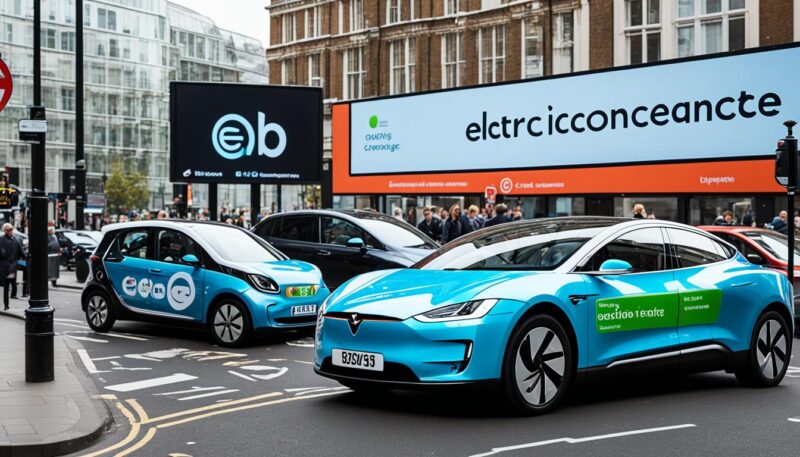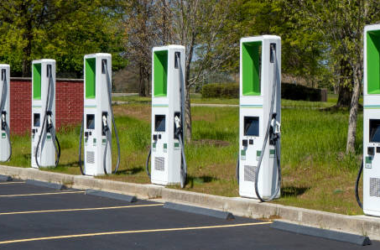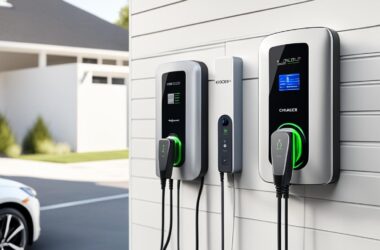Our capital is moving towards eco-friendly driving. It’s vital I give you a full guide about electric cars and London’s congestion charge. Driving in London is tough, especially with the congestion charge. But, there’s good news for electric car fans. London has perks and money-saving deals for you.
It can be tough to balance city traffic and green transport. I will explain how electric car owners can get exemptions. I’ll also talk about how fees impact your daily travel. This guide will help you understand the benefits of electric cars and the congestion charge in London.
Key Takeaways
- Electric cars offer a reprieve from the congestion charge, promoting eco-friendly driving in London.
- Exemptions and reduced fees play a pivotal role in the financial benefits of driving an electric car.
- This guide serves as an enlightening resource for understanding the relationship between electric vehicles and the congestion charge.
- Staying informed on the rules and benefits ensures electric car owners can navigate London optimally.
- Anticipating future changes to the congestion charge system is crucial for long-term planning and vehicle ownership.
Unpacking the London Congestion Charge for Electric Vehicles
The London congestion charge is important. It affects electric vehicle owners in many ways. We will look at the congestion charge zone, when it works, and the benefits for electric vehicles. We will also talk about the big changes expected in 2025 for these vehicles.
Understanding the Congestion Charge Zone and Operational Hours
The centre of London has a congestion charge zone. Drivers pay a fee to enter during certain hours. For electric vehicles, knowing this zone is key. It impacts how they move and helps London’s air quality. The charge applies from Monday to Friday. There are no charges on weekends, bank holidays, and the days between Christmas and New Year.
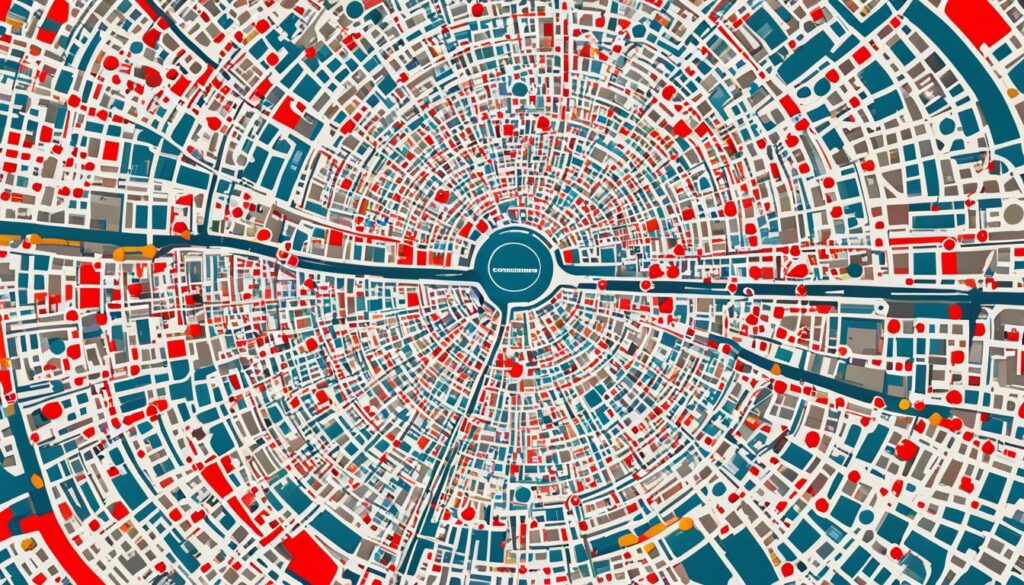
Electric vehicle drivers must know the zone and hours well. They benefit from not causing emissions. Today, electric vehicles don’t have to pay this charge. This rewards them for being good for the environment.
Emission-Free Benefits: Exemptions for Electric Cars
Electric vehicles get special treatment in the congestion charge zone. This is because they produce no emissions. This exemption shows London’s effort to support sustainable transport. Electric cars help make the city cleaner and greener.
Cleaner Vehicle Discount: How Electric Cars Stay Charge-Free
There’s a cleaner vehicle discount to encourage less pollution. It helps electric vehicles avoid the congestion charge. This discount pushes for the use of greener transport. But, electric vehicle drivers need to apply for this discount to get it.
Anticipating Changes: The 2025 Shift for Electric Vehicle Charges
In 2025, things will change for electric vehicles and the congestion charge. The current exemptions might end. This is due to more electric vehicles being used. This change will help keep London’s air clean. It shows a move towards more sustainable transport.
As 2025 approaches, electric vehicle owners should keep up-to-date. Changes might affect the congestion charge for them. It’s important they know this to stay eco-friendly.
Congestion Charge Electric Cars: Navigating Exemptions and Payments
The UK’s rules for electric cars and congestion charges can be hard to grasp. Cities now have zero-emission zones, and rules about not paying charges are changing. It’s important for electric car owners to understand how to get these exemptions. This means registering your car properly and knowing about zero-emission zones.
The Process of Applying for Congestion Charge Exemptions
If you own an electric car, getting a charge exemption is a process. First, make sure your car is eligible. It needs to be registered at the DVLA as a zero-emission vehicle. Then, apply on TfL’s website. You’ll give personal and car details, plus some documents. Getting the exemption isn’t guaranteed. Your application has to be accepted.
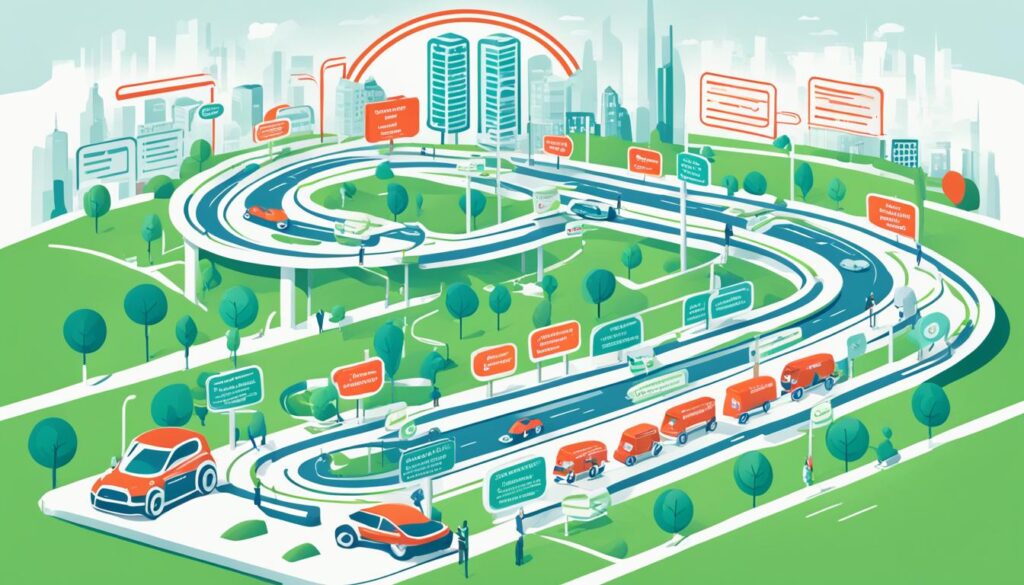
Registrations and Charges: What Electric Car Owners Need to Know
Understanding registrations and charges is key. You must register your car as zero-emissions with the DVLA. This includes having your car taxed, an MOT certificate, and insurance. Keep track of dates. Right now, electric cars don’t have to pay the congestion charge. But, this might change. Checking official sites helps you keep up with any changes.
| Requirement | Description | Procedure |
|---|---|---|
| DVLA Registration | Confirmation as a zero-emission vehicle | Documentation submission for registration |
| Vehicle Tax | Proof of up-to-date tax | Check and pay online via DVLA website |
| MOT Certificate | Valid certificate confirming car’s roadworthiness | Schedule and undergo annual MOT test |
| Insurance Proof | Valid insurance policy | Prepare and provide policy documents |
Extending Beyond London: Zero-Emission Zones in the UK
Zero-emission zones are popping up all over the UK, not just in London. Cities like Oxford and Glasgow are making these clean air areas. This is good for the environment and can save electric car owners money. Knowing where these zones are and their rules is very important.
Note: Always verify exemption and charges status directly from official city council and transport authority websites to avoid penalties or misinformation.
Conclusion
Driving electric cars in London means understanding the congestion charge. It helps manage traffic and promotes green travel. Electric cars don’t have to pay this charge, which helps the environment.
We looked at the rules, exceptions, and money-saving tips for electric car owners. Keeping up with changes is important, especially by 2025. As a driver, I learned being informed helps enjoy eco-friendly driving more.
This guide showed the connection between electric cars and the London congestion charge. It’s part of a bigger effort for sustainable living. Knowing the rules helps avoid charges and supports a clean future.





